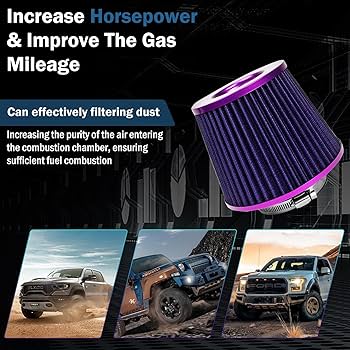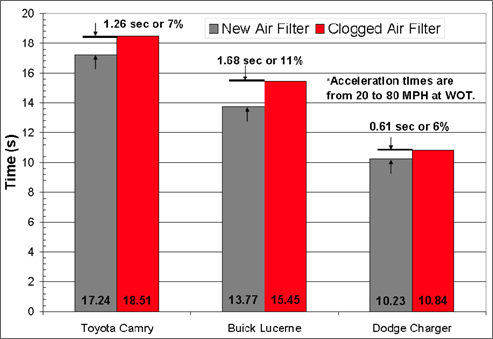Are you curious if switching to a K&N air filter can actually boost your car’s gas mileage? You’re not alone.
Many drivers wonder if this popular reusable filter delivers on its promise of better fuel economy. The idea sounds appealing—better airflow, improved engine performance, and saving money by not buying disposable filters. But does it really make a noticeable difference in your miles per gallon?
You’ll discover the truth behind K&N filters and gas mileage, learn about the small gains you might see, and understand the potential downsides before making the switch. Keep reading to find out if a K&N filter is the right upgrade for your vehicle and your wallet.
K&n Filter Basics
K&N filters are popular air filters for cars and trucks. They aim to improve airflow to the engine. Better airflow can help the engine run more efficiently. Many drivers wonder if these filters can increase gas mileage.
Understanding the basic design and features helps explain how K&N filters work. Their reusable nature also makes them different from regular filters.
Design And Features
K&N filters use multiple layers of cotton gauze. The cotton is oiled to trap dust and dirt. This design allows air to flow more freely than standard paper filters.
The frame is made from durable rubber or polyurethane. This helps keep the filter sealed and secure. The filter fits directly into the air intake system of the vehicle.
The open design aims to reduce air resistance. This can help the engine breathe easier, which may support better fuel combustion.
Reusable Nature
K&N filters can be cleaned and reused many times. Instead of replacing the filter, you wash and re-oil it. This saves money over the long term.
The cleaning process involves removing dirt and old oil. Then, you apply new oil to maintain the filter’s effectiveness. This keeps the filter working well for years.
Reusable filters produce less waste than disposable paper filters. This is better for the environment and your wallet. Regular maintenance is important to keep the filter performing well.

Credit: www.reddit.com
Impact On Gas Mileage
The impact of K&N filters on gas mileage is a topic many drivers consider. These filters claim to improve airflow, which can affect fuel efficiency. Understanding how they influence miles per gallon helps in making smart choices for vehicle maintenance.
Many tests and user experiences show a small change in fuel economy with K&N filters. The results vary depending on driving habits and vehicle types. Let’s explore the details of this impact.
Slight Mpg Gains
Some tests reveal a small increase in miles per gallon using K&N filters. This gain often comes from improved airflow to the engine. The better air intake can help the engine burn fuel more efficiently.
The increase in gas mileage is usually very slight. Most drivers may not notice a big difference on daily drives. The change often ranges from 1% to 3% improvement.
Consistency Over Time
K&N filters maintain airflow better as they get dirty compared to paper filters. Paper filters tend to clog faster, reducing airflow and fuel efficiency. A K&N filter’s design allows it to keep working well longer.
This consistency helps sustain fuel economy over time. Drivers may see steadier miles per gallon without frequent filter changes. Cleaning and re-oiling the filter keeps it performing at a good level.
Cost Considerations
Considering the cost of K&N filters helps understand their value better. These filters are reusable and designed to last longer than regular paper filters. This means the upfront cost is higher, but the need to buy replacements often decreases. Thinking about both the initial price and the savings over time gives a clear picture of the true expense.
Initial Investment
K&N filters usually cost more than standard paper filters. The price can be two to three times higher. This higher cost may seem steep at first. Yet, the filter lasts for many years with proper care. You do not have to buy a new filter every time you change your oil. This lowers the frequency of purchases and trips to the store.
Long-term Savings
Reusable K&N filters save money over time. Cleaning and re-oiling the filter is simple and cheaper than buying new ones. This means you pay once and maintain it regularly. The cost of cleaning kits is low compared to repeated filter replacements. These savings add up after several months or years of use. The durability makes the filter a good investment for many drivers.
Maintenance Requirements
Maintaining a K&N filter is essential to keep it working well. Proper care ensures the filter lasts long and performs effectively. Regular maintenance can also help maintain steady gas mileage over time. Neglecting the filter can reduce airflow and hurt engine performance.
Cleaning Process
Cleaning a K&N filter is simple but must be done carefully. Start by removing the filter from the vehicle. Use a special cleaning kit designed for K&N filters. Spray the cleaner on the filter and let it soak for about 10 minutes. Rinse the filter with cool water from the clean side out. Let it dry completely before applying oil. Avoid using harsh chemicals or high-pressure water that can damage the filter.
Risks Of Over-oiling
Applying too much oil to the filter can cause problems. Excess oil may clog the airflow sensor in the car. This can lead to poor engine performance and lower fuel efficiency. Use only the recommended amount of oil. Spread the oil evenly to avoid thick spots. Over-oiling can also attract more dirt, reducing the filter’s lifespan.
Potential Downsides
Using K&N filters may seem like a good idea for better gas mileage. Yet, there are some potential downsides to consider. These filters are not perfect for every vehicle or driver. Understanding these drawbacks helps you make a smart choice.
Maf Sensor Issues
The oil on K&N filters can sometimes cause problems. It may coat the Mass Airflow (MAF) sensor in modern cars. This coating can send wrong signals to the engine control unit. The engine may then run less efficiently. This issue can lower fuel economy instead of improving it.
Filtration Efficiency
K&N filters allow more airflow than regular paper filters. This is good for performance but can reduce filtration quality. Some dust and dirt particles may pass through. Over time, these particles can harm the engine. Keeping the engine clean is important for good gas mileage.
Engine Noise
Many users notice louder engine noise with K&N filters. The increased airflow means the engine sounds more aggressive. This noise can bother some drivers, especially in quiet areas. It does not affect performance but may reduce driving comfort.

Credit: www.amazon.com
Suitability For Different Drivers
Choosing the right air filter depends on how you drive and what you expect from your vehicle. K&N filters are designed to offer benefits like reusable design and consistent airflow. Their impact on gas mileage varies by driver type. Understanding suitability helps you decide if a K&N filter fits your needs.
Everyday Use
For daily drivers, K&N filters offer steady performance without frequent replacements. These filters keep airflow consistent even as they collect dirt. This can help maintain fuel efficiency over time. The gas mileage improvement is usually very small but steady. Cleaning and reusing the filter saves money in the long run. Noise levels may be slightly higher but do not affect daily comfort.
Performance Enthusiasts
Drivers who seek extra power may benefit more from K&N filters. These filters allow more air into the engine, which can boost performance. Better airflow can lead to minor gains in gas mileage under hard driving. Enthusiasts appreciate the reusable nature and improved throttle response. Regular maintenance, like cleaning and oiling, is important to keep the filter working well. Some may notice a slight increase in engine sound, which adds to the sporty feel.

Credit: www.energy.gov
Frequently Asked Questions
Does K&n Air Filter Help Gas Mileage?
A K&N air filter may slightly improve gas mileage by enhancing airflow. Gains are usually minimal and often unnoticeable. It maintains consistent performance longer than paper filters, saving replacement costs. Proper maintenance is essential to avoid issues with sensors and ensure efficiency.
What Are The Disadvantages Of K&n Air Filters?
K&N air filters cost more initially and need regular cleaning with special kits. Over-oiling can harm the MAF sensor. They may let more dirt through than paper filters if not maintained properly. Performance gains are usually minimal for most drivers.
Does A K&n Fuel Filter Make A Difference?
A K&N fuel filter can slightly improve airflow and maintain consistent performance. It reduces replacement costs but needs regular cleaning to avoid sensor issues. Overall, fuel economy gains are minimal and often unnoticeable in daily driving.
Does A K&n Air Filter Really Make A Difference?
A K&N air filter can slightly improve airflow and maintain consistent fuel economy longer. It’s reusable but offers minimal real-world MPG gains. Regular cleaning and proper oiling are essential to avoid sensor issues. Overall, it saves money on replacements but doesn’t drastically boost performance or mileage.
Do K&n Filters Improve Gas Mileage Significantly?
K&N filters may slightly improve gas mileage, but changes are often too small to notice.
Conclusion
K&N filters may slightly improve gas mileage, but changes are small. They keep airflow steady longer than regular filters. Cleaning and reusing saves money over time. Some cars may face sensor issues from the filter oil. Overall, benefits exist but expect only minor fuel economy gains.
Choose based on your needs and maintenance willingness.

















